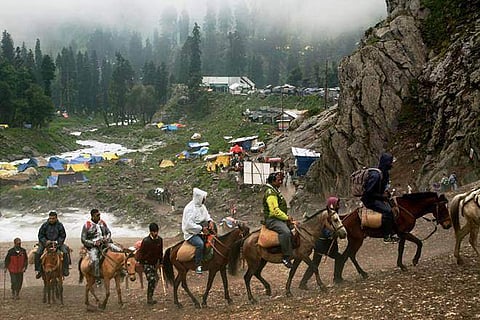

NEW DELHI: After a gap of nearly five years, India and China will resume the Kailash Manasarovar Yatra from June -- a move being seen as an attempt to normalise their relationship that was severely hit by the border standoff.
The External Affairs Ministry on Saturday said the Yatra is set to take place from June to August via two routes -- Lipulekh Pass in Uttarakhand and Nathu La in Sikkim.
The resumption of the Yatra is part of efforts by India and China to improve ties after the two countries completed the disengagement of troops at the two remaining friction points of Demchok and Depsang under a pact sealed in October last year.
“Kailash Manasarovar Yatra organised by Ministry of External Affairs is set to take place during June to August 2025. This year, 5 batches, each consisting of 50 Yatris, and 10 batches, each consisting of 50 Yatris, are scheduled to travel through Uttarakhand State crossing over at Lipulekh Pass, and through Sikkim State crossing over at Nathu La Pass, respectively,” the External Affairs Ministry said in a statement.
The yatra will pass through the Lipulekh Pass located at an altitude of 17,000 feet in Uttarakhand's Pithoragarh district. The pilgrimage, which is organised every year, was postponed in 2020 due to the COVID-19 pandemic and since then it could not be conducted due to the border tension between India and China.
India and China completed the disengagement of their troops at the last two friction points—Demchok and Depsang—under an agreement finalised on October 21, last year. Just two days later, Prime Minister Narendra Modi and Chinese President Xi Jinping met in Kazan, Russia, where they agreed to revive key bilateral dialogue mechanisms to help ease tensions and rebuild trust.
Following the Modi-Xi meeting, both sides held a series of diplomatic engagements aimed at restoring normalcy in relations. These talks marked a significant shift after years of strain following the 2020 border standoff in eastern Ladakh.
Foreign Secretary Vikram Misri travelled to Beijing in January for talks with his Chinese counterpart, Sun Weidong. The discussions focused on confidence-building measures and people-centric initiatives. One major outcome of the meeting was the decision to resume the Kailash Manasarovar Yatra—an important pilgrimage for Hindus.
Both nations agreed to take further steps to “stabilise and rebuild” ties, signaling a cautious but constructive turn in the relationship.